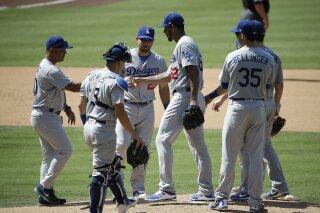Late show: MLB postseason games stretch to record length

FILE - In this Sept. 2, 2017, file photo, Los Angeles Dodgers relief pitcher Wilmer Font, center, hands the ball to manager Dave Roberts as he is relieved during the sixth inning of a baseball game against the San Diego Padres, in San Diego. No need for catchers to worry about getting they’re running in, especially during the postseason. They are taking so many trips to the mound for discussions, the average time of a nine-inning game is 3 hours, 32 minutes during the postseason, up 18 minutes since 2015. (AP Photo/Jae C. Hong, File)
LOS ANGELES (AP) — Don’t be surprised if you doze off during one of these World Series games, wake up and discover they’re not even at the seventh-inning stretch.
With managers and pitching coaches walking to the mound earlier and more often in another postseason of record game times, Justin Verlander is the lone throwback.
Verlander pitched the only complete game during the playoffs, when the average time of a nine-inning game stretched to a sometimes thrilling but often annoying 3 hours, 32 minutes, up seven minutes from last year and 18 from 2015.
“There are the outliers, there are guys like me who can still go deep in games,” the Houston ace said as he prepared to start Game 2 against the Los Angeles Dodgers on Wednesday night.
When the Dodgers last were in the World Series, Orel Hershiser pitched a pair of complete games against Oakland, a three-hit shutout in Game 2 that took 2:30 and a four-hitter in the Game 5 finale that lasted 2:51.
The average time of a nine-inning postseason game hasn’t been below three hours since 1990, according to the Elias Sports Bureau.
Attribute the elongated action — or inaction — to mushrooming mound visits along with television commercial time.
Los Angeles ace Clayton Kershaw won’t get the chance to replicate the feats of Sandy Koufax, who pitched a four-hit shutout against Minnesota in Game 5 of the 1965 Series at Dodger Stadium that took 2:34, then came back on two days’ rest to toss a three-hit shutout on the road that won Game 7, which breezed by in 2:27.
“I don’t think it’s fair to compare eras because baseball is a lot different now,” Kershaw said. “I’m not going to debate which one is better or worse. But there’s a lot of things that change over the course of the time. And we have a really good bullpen; you can’t argue with that. I think the era of baseball we are in is pretty great. I’m happy to be a part of it.”
Even before the postseason, teams were concerned the average nine-inning game during the regular-season took 3:05:11, up from 3:00:42 last year and 2:56 in 2015. Major League Baseball has proposed a 20-second pitch clock and restricting catchers to one trip to the mound per pitcher each inning, rules management can impose unilaterally for 2018.
“I think you’d start to see some of the most sophisticated signs known to man,” said Astros manager A.J. Hinch, a former big league catcher. “You can’t express enough how important it is to give no competitive advantage to the hitter when it come to your signs, to what pitch the guy is throwing. All of that is out of paranoia that you don’t want the hitter to know what’s coming.”
Talks between management and the players’ association are ongoing, and it is possible changes could be phased in over several seasons.
Advanced analytics have transformed the sport. Last year’s World Series was the first in which no starting pitcher got even one out in the seventh inning, according to Elias.
The average pitches by a starter this postseason is 81, according to Baseball Info Solutions, down from 96 in 2010. The average number of outs by postseason starters has dropped in the same span from 18 to 14.
Houston, like many teams, often prefers its starting pitchers not face batters for a third time.
“In the last probably four or five years I think things have really started to change rapidly,” Verlander said. “You can buck the trend of some of the numbers to a certain point, but it’s going to be hard for the younger generation to be able to show that they can do that when they might not even have the opportunity.”
Dodgers backup catcher Kyle Farmer was part of the 2015 Arizona Fall League experiment that limited trips to the mound. While many times the conference is to change signs or go over pitch selection, gamesmanship is part of the strategy, especially after a string of foul balls,
“It gives the hitter time to rest and time to think, and that can also mess up the hitter’s timing,” he said. “You kind of get him out of his rhythm. It’s like a chess match.”
Los Angeles outfielder Curtis Granderson would rather alter the television presentation than tinker with the way the game is played.
“Why is it so difficult that if we’re ready to play, meaning the pitcher and the hitter, can’t we just go live and put the commercial on the side? We do we have to wait? I saw it in a boxing match earlier this summer,” he said. “If you can just cut a minute off of each inning break, make it from three minutes to two minutes, you’ve already saved 18 minutes on the game.”
___
More AP baseball: https://apnews.com/tag/MLBbaseball
